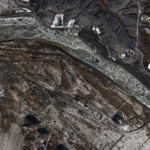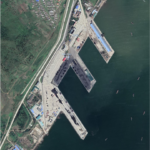February 17, 2023, by Joseph S. Bermudez Jr., Victor Cha and Jennifer Jun—
Analysis of recent commercially available satellite imagery of the Russia–North Korea railroad crossing suggests significantly increased energy and economic trade as Pyongyang seeks to tighten ties with Moscow... An approximate count of the railcars at Khasan and Tumangang shows the movement of railcars…
November 30, 2020, by Michelle Bigold, Minjung Chey and Duke Dukho Gim—
Rajin holds considerable economic value, and its viability stems from its potential to act as a regional logistics hub linking the Chinese northeastern provinces, Far East Russia and North Korea. For China, the development of the northeastern provinces of Heilongjiang and Jilin hinges on access to a seaport. Having long suffered from stagnated growth and brain drain, the region is further weighed down by inefficient transport options that continue to stymie its economic potential.
January 7, 2019, by Victor Cha, Joseph S. Bermudez Jr. and Marie DuMond—
Should inter-Korean cooperation result in the re-connection of the railways in North and South Korea, the rail networks of the Korean peninsula could then be integrated into a rail network spanning the Eurasian continent through China and Russia. If actualized, this would mark a significant diplomatic and geopolitical accomplishment for the Korean peninsula. Nonetheless, a long and significant modernization process will need to take place to fully integrate the systems in a commercially viable way.
October 18, 2017, by Marie DuMond—
Domestic stabilization is the most critical issue with unification for South Korean officials and experts, registering the highest composite score (i.e., high level of concern and low level of knowledge). This means civil-military relations, law and order, and stability in the North represent the issues for which Koreans see great consequences for national interests, but for which they have little prior knowledge or understanding. Hence, it is the greatest potential “blind spot” of unification. Costs related to unification rank a close second for South Koreans, followed by refugees, nuclear weapons, and human rights.
April 8, 2016—
A survey study of 233 of the United States’ top Asia/Korea experts, government officials, scholars, and opinion leaders found that domestic stabilization, not nuclear weapons, ranks as the #1 issue for the U.S. with unification (i.e., highest composite score in the entire survey in terms of most acute lack of knowledge/most acute concern for U.S. interests). The top four blind spots for the U.S.: 1) domestic stabilization; 2) nuclear weapons; 3) economic development; 4) cost.





